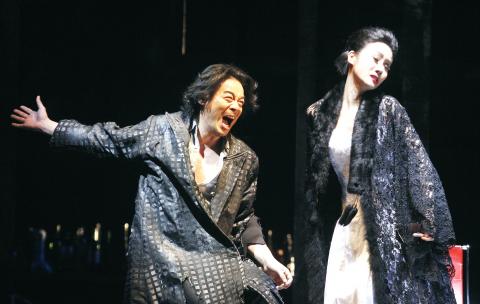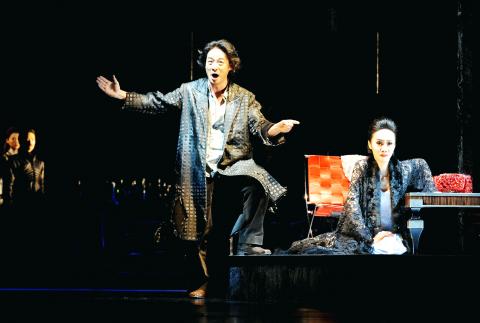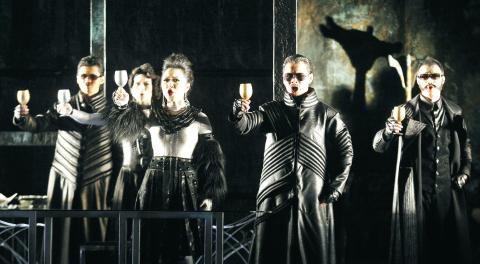The National Theater Concert Hall’s (NTCH) Taiwan International Festival of Arts 2011 gets underway this weekend with a star-studded musical adaptation of La Dame aux Camelias (茶花女) in the main theater and an outdoor carnival that features an unusual combination of French theater and lion dancing.
The outdoor show at the Chiang Kai-shek Memorial Hall Plaza tomorrow night is the official kickoff to this year’s festival, which comprises 15 productions and runs through March 26. Three groups will perform at the family-centered carnival — Ten Drum Art Percussion Group (十鼓擊樂團), the Hung Sheng Lion Dance Theater (鴻勝醒獅團) and La Compagnie des Quidams.
The 10-year-old Ten Drums first gained worldwide attention when their album Island of Drums was nominated for a Grammy in 2008, while the Hung Sheng troupe has worked to redefine lion dancing by incorporating more theater and martial arts into its performances. The French troupe is famed for its very otherworldly look, with white costumes that bring to mind a cross between the Michelin Man and a lamp — large puffy bodies with heads that light up.

Photo: Taipei Times
While the weather bureau forecasts that temperatures will drop today and tomorrow, the three troupes should generate enough energy between them to keep the crowds in the plaza warm.
The temperature should be a lot hotter in the National Theater, where burning passion is the theme of the weekend. The NTCH’s newest flagship production, La Dame aux Camelias, conceived and directed by Japanese director Tadashi Suzuki, had its world premiere last night.
For more than four decades, Suzuki has honed his unique, intense training methods, which teach actors to focus on their breathing and foot movements as a way of centering their energy and learning how to make their entire body speak, even when they are silent. His performers’ physical intensity has become a hallmark of his works and his training methods are now taught and used at institutions around the world, from the Juilliard School in New York to the Royal Shakespeare Company. As a director, he has gained fame from his reinterpretations of Western classics that break through cultural boundaries, including The Trojan Women, King Lear, Oedipus Rex and Cyrano de Bergerac (which his company brought to the National in 2009).

Photo: Taipei Times
“I am always more interested in bringing together different cultures and people in a single production ... than having similar people do similar things,” Suzuki told a press conference in Taipei last month.
La Dame aux Camelias tells the story of Marguerite Gautier, a Paris courtesan, who gives up the love of her life, Armand Duval, so that he won’t be ruined by his association with her. Giuseppe Verdi used the story for his opera La Traviata, but Suzuki wanted a more contemporary look.
The musical is set in “contemporary Europe,” but the cast, led by Weng Ning-chien (翁寧謙) as Marguerite and Chou Ming-yu (周明宇) as Armand, and the songs are all modern Taiwanese love ballads that should be familiar to local audiences.

Photo: Reuters
Weng and Chou spent a month last year training with Suzuki’s own troupe in Togo, Japan, as part of their rehearsal process.
As has been the case with previous NTCH flagship productions, the costumes — this time by Lin Ping-hao (林秉豪), who is also credited with the makeup — are stunning.
The show will be performed in Chinese, with English subtitles. There is a pre-show talk — in Mandarin —in the lobby that starts a half-hour before each performance, and after Sunday’s matinee there will be a “meet the artist” session in the theater.
The NTCH is taking this production down south later this month for two shows in Greater Kaohsiung — only the second time it has taken one of its flagship productions on the road. The first was Legend Lin Dance Theatre’s (無垢舞蹈劇場) Song of Pensive Beholding (Chants de la Destinee, 觀) in July last year.

On Jan. 17, Beijing announced that it would allow residents of Shanghai and Fujian Province to visit Taiwan. The two sides are still working out the details. President William Lai (賴清德) has been promoting cross-strait tourism, perhaps to soften the People’s Republic of China’s (PRC) attitudes, perhaps as a sop to international and local opinion leaders. Likely the latter, since many observers understand that the twin drivers of cross-strait tourism — the belief that Chinese tourists will bring money into Taiwan, and the belief that tourism will create better relations — are both false. CHINESE TOURISM PIPE DREAM Back in July

Could Taiwan’s democracy be at risk? There is a lot of apocalyptic commentary right now suggesting that this is the case, but it is always a conspiracy by the other guys — our side is firmly on the side of protecting democracy and always has been, unlike them! The situation is nowhere near that bleak — yet. The concern is that the power struggle between the opposition Chinese Nationalist Party (KMT) and their now effectively pan-blue allies the Taiwan People’s Party (TPP) and the ruling Democratic Progressive Party (DPP) intensifies to the point where democratic functions start to break down. Both

Taiwan doesn’t have a lot of railways, but its network has plenty of history. The government-owned entity that last year became the Taiwan Railway Corp (TRC) has been operating trains since 1891. During the 1895-1945 period of Japanese rule, the colonial government made huge investments in rail infrastructure. The northern port city of Keelung was connected to Kaohsiung in the south. New lines appeared in Pingtung, Yilan and the Hualien-Taitung region. Railway enthusiasts exploring Taiwan will find plenty to amuse themselves. Taipei will soon gain its second rail-themed museum. Elsewhere there’s a number of endearing branch lines and rolling-stock collections, some

This was not supposed to be an election year. The local media is billing it as the “2025 great recall era” (2025大罷免時代) or the “2025 great recall wave” (2025大罷免潮), with many now just shortening it to “great recall.” As of this writing the number of campaigns that have submitted the requisite one percent of eligible voters signatures in legislative districts is 51 — 35 targeting Chinese Nationalist Party (KMT) caucus lawmakers and 16 targeting Democratic Progressive Party (DPP) lawmakers. The pan-green side has more as they started earlier. Many recall campaigns are billing themselves as “Winter Bluebirds” after the “Bluebird Action”